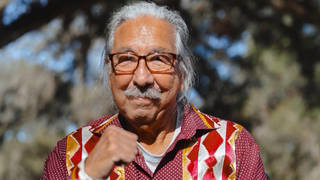
Related
Topics
Guests
- Azzurra Crispinomedia co-chair of the Incarcerated Workers Organizing Committee.
- Kinetik Justiceco-founder of the Free Alabama Movement. He is currently serving his 33rd month in solitary confinement at the William C. Holman Correctional Facility in Alabama.
The largest prison work strike in U.S. history has entered its third week. Organizers report that as of last week at least 20 prisons in 11 states continued to protest, including in Alabama, California, Florida, Indiana, Louisiana, Michigan, New York, Ohio, South Carolina and Washington. The Incarcerated Workers Organizing Committee says at one point about 20,000 prisoners were on strike. With protest has come punishment. Several facilities have been put on lockdown, with prisoners kept in their cells and denied phone access both before and during the strike. Organizers have also been put in solitary confinement.
Transcript
JUAN GONZÁLEZ: The prison guard work strike at the Holman Correctional Facility in Alabama comes as the largest prison work strike in U.S. history has entered its third week. Organizers report that, as of last week, at least 20 prisons in 11 states continued to protest, including Alabama, Florida, Indiana, Michigan, New York, Ohio, South Carolina and Washington. The Incarcerated Workers Organizing Committee says at one point about 20,000 prisoners were on strike. With the protest has come punishment. Several facilities were put on lockdown, with prisoners kept in their cells and denied phone access both before and during the strike. Organizers were also put in solitary confinement.
AMY GOODMAN: Joining us from Austin, Texas, is Azzurra Crispino, the media co-chair of the Incarcerated Workers Organizing Committee. Still with us, Pastor Kenneth Glasgow of The Ordinary People Society, TOPS, and Kinetik Justice inside Holman. Juan?
JUAN GONZÁLEZ: Well, Azzurra Crispino, I’d like to start with you. Talk about this nationwide strike. Is this—does this have any precedent in modern U.S. history? And how extensive is it? And some officials are claiming that it’s already petered out.
AZZURRA CRISPINO: Well, certainly, the history here bears repeating. When George Jackson was assassinated 45 years ago, he had been calling for a prisoners’ union and a nationwide prison strike. So it’s fitting that on September 9th, on the 45th anniversary of the Attica uprising, that we were finally able to deliver the largest prison strike that has ever been seen in U.S. history. In terms of the momentum, certainly now there has been a shift towards dealing with repression. But as you stated, there are several facilities across several states in which strike action continues to occur.
AMY GOODMAN: So what exactly is happening right now across the country?
AZZURRA CRISPINO: Well, there’s been a shift to a lot more hunger strikes. So, in Merced County jail in California, over a hundred prisoners are on hunger strike. They are joined by the wife of one of the inmates, Victoria, who is also on hunger strike. They are calling for a 2,000-calorie diet, an end for solitary confinement for juvenile detainees, and, in addition, for the firing of a Lieutenant Moore, who’s been particularly sadistic as a guard there. In South Carolina, there continue to be uprisings, specifically at Turbeville Correctional Institution. And there have been continuing hunger strikes in Michigan, as well as Ohio. In Michigan, Dying to Live, Cesar DeLeon and others have been a hunger strike for more than a hundred days. They are calling for an end to long-term solitary confinement past a year.
But I think the greatest conversation has to deal with repression, and all of that is occurring. So we just heard, less than two days ago, that at Kinross unit in Michigan, that guards—initially it seemed that there was going to be a conversation. The warden had come out and was speaking to the inmates, over 400 of them, which had peacefully marched in the yard. But after the warden left, basically, a riot repression team came in and dragged prisoners out of their showers and out of their cells, zip-tied their arms behind their back and threw them out in the yard and left them out there for five to six hours in the rain without any access to bathroom facilities. So the repression that prisoners are facing around the country for having participated in the strike is real, and it’s very severe. So right now we’re really focused on responding in order to help get the word out and get people to call into those units, so that we can help to support those who are being repressed, as well as to continue supporting strike workers, whether that’s people who are continuing to be on work stoppages and rolling work stoppages or continuing to hunger strike.
AMY GOODMAN: Finally, Kinetik Justice, is the strike still going on among prisoners at Holman?
KINETIK JUSTICE: Uh-uh, not at Holman, right here or nothing. I want to say that the strike is not going on. Like, a lot of things have been completely unorthodox at Holman for the last few days. And in the last two days, we’ve actually had officers to augment the shifts to allow the people to move around. So, a lot of things are trying to get back to normal, in the sense that people are finally getting out of these dormitories and moving around. So, things are not locked down as a strike. So, no, not at Holman, it’s not continuing, as we set out.
AMY GOODMAN: Well, we want to thank you all for being with us. And, of course, we’ll continue to follow this. Kinetik Justice, in solitary confinement at Holman in Alabama, prison of a thousand men. Azzurra Crispino, joining us from Austin, media co-chair of the Incarcerated Workers Organizing Committee. And thanks so much to Pastor Kenneth Glasgow, founder and national president of The Ordinary People Society, TOPS, a faith-based organization focused on criminal justice and rehabilitation of repeat offenders.












Media Options